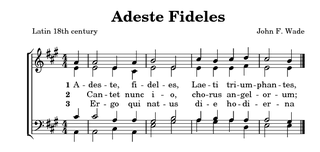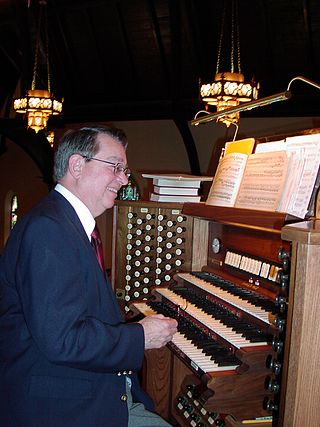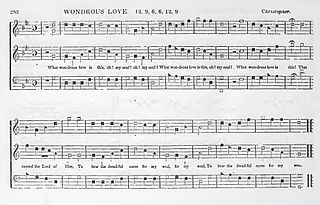Related Research Articles

The epiclesis refers to the invocation of one or several gods. In ancient Greek religion, the epiclesis was the epithet used as the surname given to a deity in religious contexts. The term was borrowed into the Christian tradition, where it designates the part of the Anaphora by which the priest invokes the Holy Spirit upon the Eucharistic bread and wine in some Christian churches. In most Eastern Christian traditions, the Epiclesis comes after the Anamnesis ; in the Western Rite it usually precedes. In the historic practice of the Western Christian Churches, the consecration is effected at the Words of Institution though during the rise of the Liturgical Movement, many denominations introduced an explicit epiclesis in their liturgies.

"Be Thou My Vision" is a traditional Christian hymn of Irish origin. The words are based on a Middle Irish poem that has traditionally been attributed to Dallán Forgaill.

Robert Charles Sproul was an American Reformed theologian and ordained pastor in the Presbyterian Church in America. He was the founder and chairman of Ligonier Ministries and could be heard daily on the Renewing Your Mind radio broadcast in the United States and internationally. Under Sproul's direction, Ligonier Ministries produced the Ligonier Statement on Biblical Inerrancy, which would eventually grow into the 1978 Chicago Statement on Biblical Inerrancy. Along with Norman Geisler, Sproul was one of the chief architects of the statement. Sproul has been described as "the greatest and most influential proponent of the recovery of Reformed theology in the last century."
Decisions concerning the conduct of public worship in the Church of Scotland are entirely at the discretion of the parish minister. As a result, a wide variety of musical resources are used. However, at various times in its history, the General Assembly has commissioned volumes of psalms and hymns for use by congregations.

A hymn tune is the melody of a musical composition to which a hymn text is sung. Musically speaking, a hymn is generally understood to have four-part harmony, a fast harmonic rhythm, with or without refrain or chorus.

Jeremiah Eames Rankin was an abolitionist, champion of the temperance movement, minister of Washington D.C.'s First Congregational Church, and correspondent with Frederick Douglass. In 1890 he was appointed sixth president of Howard University in Washington, D.C. Howard's Andrew Rankin Memorial Chapel was built during Jeremiah Rankin's tenure as president (1890–1903) and named after his brother. Rankin is best known as author of the hymns "God Be with You 'Til we Meet Again" and "Tell It to Jesus". In 1903 Rankin published a fictional journal of Esther Burr.

Shadyside Presbyterian Church is a large congregation of the Presbyterian Church (U.S.A.) in an historic part of Pittsburgh, Pennsylvania, United States. Located at the corner of Amberson Avenue and Westminster Place in the Shadyside neighborhood, Shadyside Presbyterian Church was founded in 1866 as a congregation in the Presbyterian Church in the U.S.A. and has enjoyed a long history of local, national, and global recognition for its outreach and service.
Russell Schulz-Widmar is a composer, author, and conductor, and a former Professor of Liturgical Music at the Seminary of the Southwest in Austin, Texas. For much of his career he lived in Austin, Texas and upon retirement he has divided his time between Berlin, Germany and Dallas, Texas. He is married to Hubertus Schulz-Wilke.

Robert Powell is an American composer, organist, and choir director.
Amanda Husberg was an American composer of hymns.
Richard Leach is an American hymn writer and poet.
Walter Russell Bowie, was a priest, author, editor, educator, hymn writer, and lecturer in the Episcopal Church.

Psalm 24 is the 24th psalm of the Book of Psalms, beginning in English in the King James Version: "The earth is the LORD's, and the fulness thereof". In the slightly different numbering system used in the Greek Septuagint version of the Bible and the Latin Vulgate, this psalm is Psalm 23. In Latin, it is known as "Domini est terra et plenitudo eius orbis terrarum". The psalm is marked as a Psalm of David.

Psalm 47 is the 47th psalm of the Book of Psalms, beginning in English in the King James Version: "O clap your hands". The Book of Psalms is the third section of the Hebrew Bible, and a book of the Christian Old Testament. In the slightly different numbering system used in the Greek Septuagint and Latin Vulgate translations of the Bible, this psalm is Psalm 46. In Latin, it is known as "Omnes gentes plaudite manibus". The psalm is a hymn psalm. It is one of twelve psalms attributed to the sons of Korah, and one of fifty-five psalms addressed to the "Chief Musician" or "Conductor".
Joel Magus P. Navarro is a Filipino-American conductor and music educator. He is one of the Philippines' most esteemed choral conductors. He is also a composer, singer, arranger, choral clinician, writer, producer, music minister, author, and book editor.

"What Wondrous Love Is This" is a Christian folk hymn from the American South. Its text was first published in 1811, during the Second Great Awakening, and its melody derived from a popular English ballad. Today it is a widely known hymn included in hymnals of many Christian denominations.

"Sun of Unclouded Righteousness" is a little-known 1758 Christian hymn written by Charles Wesley, the brother of John Wesley, the founder of Methodism. It was written as an intercessory hymn praying for the salvation of Muslims and calls for their conversion to Christianity. It had fallen out of use by around 1880.
Ruth Carolyn Duck is an ordained pastor in the United Church of Christ, a liturgical theologian and retired professor of worship who taught for 27 years at Garrett-Evangelical Theological Seminary in Evanston, Illinois. Duck is best known for her work as a composer, writer and adaptor of hymns. In 1973, she was part of the committee at the Ecumenical Women's Center of Chicago that produced Because We Are One People, the first 20th century collection of original and adapted hymns that promoted the use of “non-sexist language”. Since that time, Duck has written over 150 hymns, edited three books of sources for worship services and written on the topic of Trinitarian theology, all with an eye toward facilitating the use of gender inclusive language in the context of Christian worship. She is a leading, contemporary champion for and developer of inclusive language worship sources.
Thy hand, O God, has guided is a Christian hymn with words by Edward Plumptre and music by Basil Harwood.
References
- ↑ "First Presbyterian Church South Bend FPCSB". Fpcsouthbend.org. Retrieved 2012-02-10.
- ↑ Archived October 29, 2009, at the Wayback Machine
- ↑ Dalles, John A. (2010-04-10). "Transformations and Whispers: Live Worship Webcasts - A Wekiva Presbyterian First". Transformationsandwhispers.blogspot.com. Retrieved 2012-11-12.
- ↑ "Reindeer Music". Reindeer Music. 2011-08-23. Retrieved 2012-02-10.
- ↑ "The Music of John S. Dixon". Johnsdixon.com. Retrieved 2012-11-12.
- ↑ "MorningStar Music Publishers". Morningstarmusic.com. Archived from the original on 2012-02-25. Retrieved 2012-02-10.
- ↑ "Hinshaw Music, Inc". Hinshawmusic.com. 2009-02-04. Retrieved 2012-02-10.
- ↑ "Selah Publishing Co. - Selah helps successful church musicians". Selahpub.com. Retrieved 2012-02-10.
- ↑ "Wayne Leupold Editions". Wayneleupold.com. Retrieved 2012-11-12.
- ↑ Presbyterian Hymnal, #127
- ↑ LindaJo McKimm, The Presbyterian Hymnal Companion, pp. 106-107
- ↑ The Presbyterian Hymnal, #418
- ↑ The Presbyterian Hymnal Companion, p. 290
- ↑ Marva J. Dawn, Is It a Lost Cause?: Having the Heart of God for the Church's Children, p. 1
- ↑ "Unknown" (PDF). Giamusic.com. Archived from the original (PDF) on 2012-02-22. Retrieved 2012-11-12.
- ↑ "O God of Love, Grant Us Your Peace". Hymntime.com. Archived from the original on 2012-07-07. Retrieved 2012-02-10.
- ↑ "Self-Development of People (SDOP) — Mission and Ministry — GAMC" (PDF). Pcusa.org. Retrieved 2012-02-10.
- ↑ Jerry L. Van Marter (April 6, 2010). "News About People" . Retrieved 2012-11-12.
- ↑ Lori L. Van Ingen (April 10, 2010). "Hymn Contest Winner Has Ties Here". Articleslancasteronline.com. Archived from the original on April 18, 2010. Retrieved 2012-11-12.
- ↑ Deb Loftis. "The Hymn Society News and Views". Thehymnsociety.org. Archived from the original on 2011-07-24. Retrieved 2012-11-12.
- ↑ "John Dalles Biography- GIA Publications". Giamusic.com. Retrieved 2012-11-12.
- ↑ "annedalles.com". annedalles.com. Archived from the original on 2011-07-07. Retrieved 2012-02-10.